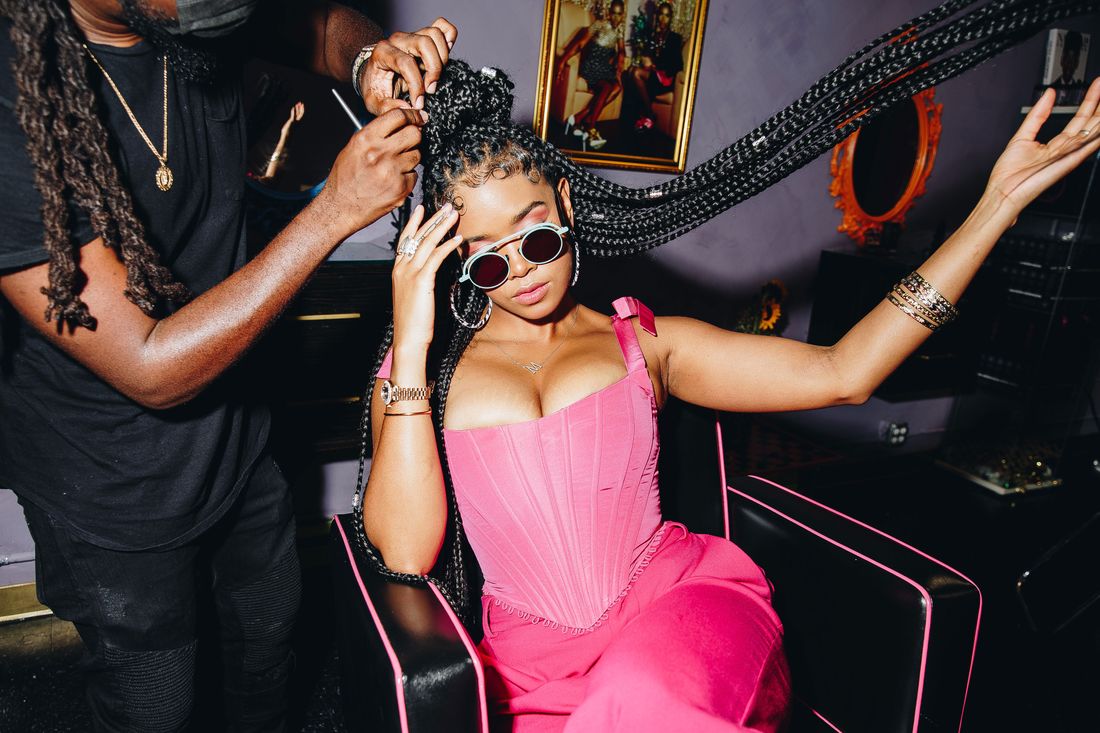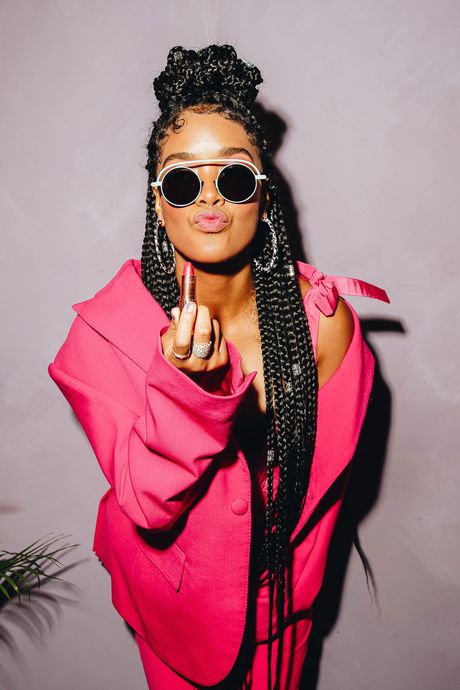
Over the course of, say, four minutes, I witness Gabi Wilson hop from a Rhodes piano stacked on its suitcase to a synth across the studio, on which she begins banging out the riff from Coldplay’s “Clocks,” before moving to a drum kit, whaling on the thing without mercy. Her grin gets wider as she builds momentum, curls flying as she headbangs. Maybe it’s because this is the first bit of live music I’ve seen in 17 months, or because Wilson— better known as H.E.R.— is about to rehearse for her first IRL set in the same time frame, or because we’re due for a reappraisal of mid-career Coldplay as part of the latest resurgence of all things early aughts. Whatever the case, this shit unequivocally slaps.
Wilson runs through this “Clocks” routine four or five ecstatic times until she is gently reminded by a band member that it’s time to start the actual rehearsal for their two-night Hollywood Bowl takeover alongside the Los Angeles Philharmonic, which kicks off in 48 hours. She is tinier than I had expected and presidential in manner, pacing the makeshift stage in mint-green sneakers that match her billowy, custom Louis Vuitton button-down, which is outfitted, I notice upon examination, with a functional built-in backpack. The same bandmate turns to me, smiling. “You see how she is?” he says. “She’ll keep going all night if you let her.” He gathers the band for a prerehearsal prayer: “Amen … We’re gonna have a hell of a show!” “Heck of a show,” Wilson counters. “You can’t pray and then say ‘hell of a show’!”
I am by no means a live-music purist, which may explain why I didn’t fully grasp the deal about H.E.R. before this experience in her Burbank practice space. But watching Wilson rip her silver Stratocaster, I get it. Like many, I imagine, my introduction to the 24-year-old’s old-soul R&B came through a blitz of awards-show appearances one might describe as “John Legend–esque”— ubiquitous and puzzlingly so. Name an awards show in the past few years and odds are H.E.R. has coolly graced its stage, face obscured behind a pair of her signature outsize sunglasses. She has received 13 nominations in three years; at the most recent ceremony, her George Floyd–inspired “I Can’t Breathe” beat out Beyoncé and Taylor Swift for Song of the Year. She shredded along to “America the Beautiful” to open this year’s Super Bowl, and she is halfway to an EGOT, having won an Academy Award for Best Original Song for her contribution to the Judas and the Black Messiah soundtrack. She recently posted, and promptly deleted, videos of herself boogying down with the Obamas at Barack’s 60th birthday — an event whose ranks of uninvited guests, owing to COVID-related capacity issues, included Davids Letterman and Axelrod. Hell, she booked her first acting role in the upcoming Color Purple movie musical before I could finish writing this.
It’s not that H.E.R. is lacking in stans; two sold-out nights at the 18,000-capacity Hollywood Bowl don’t lie. She’ll follow those with the Lights On Festival, the two-day celebration of R&B that Wilson is bringing to the Bay Area in September and Barclays Center in October. But there is something of a disconnect between her industry omnipresence and her position in pop culture — more accurately, with the culture of her own generation — that seems to invite skepticism. It may or may not surprise you that a search for “H.E.R. industry plant” results in a bounty of conspiratorial headlines and Reddit threads, of which Wilson is all too aware. “With social media, people think they know everything about success,” she says between rehearsals, describing the years of development that predated her debut, as if a silent alarm for potential cynicism had sounded. “People see my success now, and they don’t understand the sacrifices, the 15-hour days in the studio, the pressure from my parents to go to college.” Wilson has worked hard to get here, that much is clear; still, showbiz isn’t exactly a meritocracy.
Born in 1997 in Vallejo, California, a city with funk in the tap water, Gabriella Wilson took notes from her father, who played funk and blues covers in his band, the Urban Bushmen, when he wasn’t working construction. “Every weekend, we were going out to some festival,” she remembers. “Sometimes Con Funk Shun was playing. I remember seeing Sheila E.’s dad perform.” Their household included three generations of extended family, which put her on to even more music: Mariah Carey, Whitney Houston, AC/DC, Neil Diamond, Johnny Mathis. She obsessively rewatched concert DVDs, studying how they did it: Lenny Kravitz’s “American Woman,” Eddie Van Halen’s “Beat It,” and, of course, “Purple Rain” any time Prince played it.
In the early days of YouTube, back when “going viral” was still a mostly foreign concept, Wilson’s father posted a video of 9-year-old Gabi doing her precocious thing: a Minnie Riperton song on guitar, a drumbeat to Prince’s “Musicology.” “So the producer from Maury saw it. And the Maury show has to have one positive episode a year. Like, it’s a requirement,” she says, giggling. Cut to Wilson on piano, fearlessly belting out Alicia Keys’s “Fallin’” in a voice that sounds twice her age on a 2007 episode called “Most Talented Kids.” The Wilsons’ phone rang off the hook — the Today show, Carson Daly. By 14, she had signed to RCA Records. By 19, she had debuted the vibey H.E.R., Vol. 1 EP under a pointedly mysterious new moniker that stood for “Having Everything Revealed,” and she appeared on album covers only in silhouette. Early RCA press releases offered no biographical information; interviews were conducted strictly by phone; and during live performances, the sunglasses stayed on. Her least guarded, and seemingly unscripted, social media moments were those posts from Obama’s maskless bacchanal, of her dancing with the birthday boy in a flowery muumuu, which were deleted after right-wing media outlets and Twitter narcs dubbed the party a superspreader event. (Half a point for entertaining Filipino auntie TikTok post-Grammys, too.)
The initial anonymity was a canny move in an era of chronic celebrity overshare, equal parts self-preservation and marketing. When Wilson tells me the idea was to get people to focus on the art when they seem to want everything but, it feels genuine. When you watch her obsess over a seemingly minor transition in rehearsal, it’s clear how seriously she takes her craft. “We live in a world where it’s full package — how do you look, who are you dating, who is she?” Wilson says, swiveling in a chair in one of the space’s private studios. “We’ve lost sight of what’s important, which is the music.” All the same, the industry loves a shtick. I wonder whether marketing tools like the 24/7 shades are as savvy now as they were when H.E.R. emerged; maybe they’re part of the disconnect. Naturally, less than a week after Vol. 1’s release, Genius had already outed the singer’s identity, though she wouldn’t confirm it for two years. Wilson admits she’s still learning to navigate how much to let the world see, though she has graduated to the occasional pair of clear lenses, like the chunky black-framed ones she is wearing today. Between her Twitter and Instagram accounts, she follows a total of zero people, and her tone is mostly business.
“Most of the time, people think success is followers and crazy BTS popularity, like if you’re not Beyoncé, you’re not famous. ‘Oh, you’ll get there one day.’ Like, everybody doesn’t want to be Beyoncé!” Wilson goes on. “For me, I grinded it out kinda like a rapper: I dropped a mixtape, nobody knew who I was, it was a very slow build, and here we are now. The awards shows and all that stuff, that was surprising to me. But I realized, Oh my gosh, I’ve arrived, and in a different way. You don’t need some No. 1 radio single—even though I got that!” she says, laughing, feeling herself for a moment. “But you don’t need that to be worthy of awards and accolades.” And she’s right, though I imagine her old-school musicality must be catnip to the people who run institutions like the Grammys.
Wilson carries herself in conversation as she carries herself onstage — attentive, polite, professional, and much older than 24, to the point where you wonder if the woman has ever missed a beat. When I ask if she ever had a “fuck around” phase, she smiles like someone who long ago reached enlightenment. “You know what’s crazy? I never wanted that,” she says. There has been, Wilson confesses, one rebellious act in her life; it’s memorialized by the delicate snake tattoo on her right calf, which I figured was some kind of metaphor. “Oh, that’s my snake who passed away,” she says matter-of-factly. “His name was Prince Roger.” Wilson has owned a lot of snakes, a gesture meant to freak out her mom that turned into something of a lifestyle. “Like, one of my snakes had his own room,” she goes on, regaling me with tales of the snake that took over her studio during the years she spent on tour. “I would come in the door, like, ‘You good, Mike?’ Yeah, his name was Mike. And he would be up in the light, or maybe he’d be on the piano.” Snakes aside, any time she tried to stray off course, it didn’t feel right. “Everybody has a different definition of what it is to grow up,” she says. “I see that it’s responsibility. I never asked for that responsibility, but I worked toward it. I’m human, and I have my days. But at the end of the day, I live and die by this.”
A cover from Marvin Gaye’s What’s Going On opens the set Wilson is rehearsing today. From there, it’s H.E.R. originals for an hour, some of which scan a bit sleepy on record, the kind of pleasant enough neo-soul you put on to wash the dishes. There’s a safeness to the songs on her latest album, Back of My Mind, a commitment to a “Chilled R&B” streaming-playlist vibe, that makes me long for H.E.R. to get weird with it, to bring the funk the way she does live. It’s as if, being exalted among the R&B greats, there’s no room for trial and error. But there’s something pure about her devotion to the form at a time when rap and R&B feel increasingly interchangeable, a reverence for history that seems to separate her from those she’s categorized amongst. The Lights On Festival was curated by Wilson, and its two stops honor the places she has called home, Brooklyn and the Bay. The lineup splits the difference between old school (Maxwell, SWV) and new school (Bryson Tiller, Chloe Bailey). Wilson is heartened by the interest in a weekend of 100 percent R&B. “It’s real music. Not that any other music is fake music, but … you know?” she says, laughing.
The Lights On Festival comes to Barclays Center October 21 and 22.
More From fall preview 2021
- 10 Video Games We’re Excited to Play This Fall
- Glaive, IRL
- 79 New Albums We May or May Not Hear This Fall


